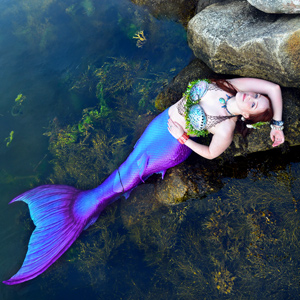Ok, so I haven't seen any of this information on here and I thought it might be helpful for those of you who want to wear any kind of jewelry or accessories in chlorinated or salt water. I am a jeweler by profession. That doesn't mean I just string beads (no offense to you beaders out there), but I size rings, cast precious metals, and fabricate in silver and gold. I know quite a bit about gold and silver, and I see a lot of these metals damaged by exposure to harsh chemicals, especially chlorine!
Sterling Silver: NOT ok for chlorine, sometimes ok for salt water
Sterling silver is an alloy of 92.5% silver and the rest is copper. The copper in the alloy reacts very badly with chlorine and can turn your sterling jewelry black! This is harder to remove than regular tarnish, and can pit and damage the jewelry much more especially with repeated exposure. As far as I can tell, sterling silver by itself is not bothered too much by ocean water. HOWEVER, most clasps have a little steel spring inside of them which can VERY quickly corrode and rust if exposed to salt, even if only a tiny bit.
Please don't wear your silver jewelry in the pool or hot tub! And you should take it off when you shower as well, because even some chemicals in soaps and shampoos can damage it.
Yellow and White Gold: NOT ok for chlorine, sometimes ok for salt water
Yellow gold is alloyed with zinc, copper and/or silver. White gold is usually alloyed with nickel, copper and zinc. Both copper and nickel are very reactive and they can react very badly with chlorine. I don't know all the chemistry details about the reaction between copper or nickel and chlorine, but I have seen its effects: pitting, discoloration and structural damage to jewelry. This is BAD NEWS for your wedding bands, necklaces, anklets, etc. I have seen wedding bands damaged beyond repair by chlorine and other chemicals (ammonia being one). DON'T wear it in the pool!
As with sterling silver, yellow and white gold are ok by themselves in ocean water. HOWEVER, take into account those clasps with steel springs, and the stones in your jewelry. Some gemstones are quite fragile and treated in ways that could be damaged by salt water. Mostly this would include emeralds and opals. But that's a whole other discussion..
Base Metals (Nickel, Pewter, other Costume Jewelry): NOT ok for chlorine, most likely not ok for salt water
This is a large class of metals and there are almost as many alloy variations as there are products! Mostly what I see is nickel based (like the silver toned findings you buy at craft stores like Michael's, Hobby Lobby, etc.). These nickel based findings (earring wires, clasps, jump rings) may hold up ok for a while but eventually they will probably start taking some damage. I don't know as much about the time frame for this but with as much time as people in this community spend swimming, it's probably not a good idea to use these findings long term.
I'm not completely sure about the reaction of nickel and copper in salt water, it might be ok. But IMO, I would not trust them long term there either.
So What IS a safe metal for use in chlorine?
As far as I can tell right now, the two best choices you have for metals that will be repeatedly exposed to chlorine are STAINLESS STEEL and TITANIUM. Now it's going to be pretty much impossible to find titanium earring wires or clasps, but there are plenty of stainless steel options. Just make sure that the package of what you're getting says STAINLESS STEEL, because it can be the same color as the nickel findings.
***UPDATED 5/8/17***
It has been brought to my attention that rust can still develop on stainless steel, as there are different kinds and qualities of stainless steel. SO please if you decide to use stainless steel, I would recommend also doing a test with a sample of the particular finding you are going to use. I apologize for not giving this correct info sooner, as I have more experience with silver and gold***
However, even if you get a stainless steel clasp (lobster claw or spring ring) please remember that the little spring inside the clasp will probably still rust if exposed to salt water. Go with another style clasp on a necklace that you will wear in the ocean, like an S-hook clasp or a toggle clasp.
HELP! I already got my sterling silver/gold jewelry in chlorinated water!
Don't panic yet! The first thing to do is rinse your jewelry in plain tap water or a gentle soap solution. Don't immediately plunge it into your jewelry cleaner you bought from Wal-Mart! I tend not to trust random store bought jewelry cleaners, and I recommend against them. They could also cause a bad reaction with the chlorine already on your jewelry. After you have rinsed your jewelry to prevent further damage, look it over yourself and then take it to a trusted jeweler to have them check it further for damage. They can professionally remove the tarnish, polish out surface pitting, and advise you on your particular case. They also can recommend a safe cleaner for you to use at home and sometimes have some for sale.
Above all, the important thing to remember is NOT TO WEAR YOUR SILVER AND GOLD JEWELRY IN THE POOL! EVER! If you want to read more about why, this technical article has some great info: http://technical-articles.hooverands...ect-your-gold/
I am thinking of conducting some of my own tests with various base metals at some point to see how they hold up in pools and the ocean. Until then, feel free to ask me any more questions or send me a message for more information!
Hope this helps all of you who are getting ready to make accessories, so you can continue to enjoy them for a long time!




 Reply With Quote
Reply With Quote

















 haha. I did have some split rings in SS so I'll have to replace those. As for the based metals, I've been using those for years on end and have customers that use my jewelry for 2-8x a week (hours in chlorine each time) for years and still no report of corrosion. Then again both of is take very good care of our tails and accessories- always rinse, dry, and hang dry before storing. I think both of is do making soda dips to help with acidity too.
haha. I did have some split rings in SS so I'll have to replace those. As for the based metals, I've been using those for years on end and have customers that use my jewelry for 2-8x a week (hours in chlorine each time) for years and still no report of corrosion. Then again both of is take very good care of our tails and accessories- always rinse, dry, and hang dry before storing. I think both of is do making soda dips to help with acidity too. 









Bookmarks